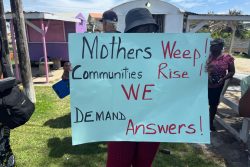The strange peacefulness of this modern era has lulled us into a state where we have begun to subconsciously believe that the world is free of prejudice or inequality. This peacefulness is best described as strange, because it is not completely real. We believe that we are experiencing peace when there are no massive wars or massacres. Yet, certain prejudicial roots still actively creep underneath the surface of this seemingly peaceful modern world, waiting to burst out and bloom into conflict. If these roots are not hidden, then they are distant. That is, they thrive in areas where those they affect are unable to voice their struggles in a manner that is able to reach the greater world.
Nevertheless, the more important discussion lies not in whether suffering and prejudice still exists, but in how we have changed the way that we respond to it.
Human beings view the world through a lens constructed from their own identities and experiences.
To put it simply, we are not looking at the world directly, but rather viewing it as a reflection on a mirror. We are able to see the flaws in our world quite clearly, but can we truly distinguish whether the flaws are problems in the world or cracks in our own mirror? If we do discover that the cracks are in our own mirrors, how many of us are willing to fix it?
We are taught about social ills such as racism, sexism and other kinds of discrimination. We learn about wars and massacres. Yet, being able to understand and define these terms does not reduce the distance present between those who have experienced these issues and those who have not. Today’s younger generation does not experience a deficiency in information or knowledge. In fact, technological advancements have only increased the information that is available to us on a daily basis.
What we do struggle with, is finding ways by which we can contribute towards mitigating these issues.
All of our mirrors have cracks. We see them every single day. Yet, we have convinced ourselves that the cracks are not in the mirror but in the world that we see reflected in the mirror. As such, we have absolved ourselves of the responsibility of fixing the cracks and given up the ability to recognise their existence in the first place. The average individual may not view themselves as being discriminatory, nor would they have engaged in actions or words that indicate such character. This does not mean that we are not participating in a wider system that facilitates the existence of discrimination or inequality.
In the past, fights against social ills involved revolutions and great social changes. Today, however, it is as simple as remembering that these issues still continue to exist and ensuring that we hold each other accountable. It can be as simple as ensuring that the businesses you support, the celebrities and influencers you follow and the media you consume do not encourage or participate in the existence of those issues. It is as simple as being aware and proactive.
The burden of creating a safer and more inclusive world has been considerably lightened by the work of our predecessors. However, as long as the burden still exists, we continue to have work to do as well.











